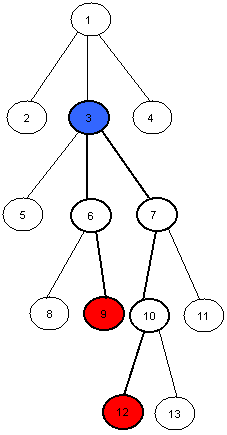| Submit | All submissions | Best solutions | Back to list |
LCA - Lowest Common Ancestor |
A tree is an undirected graph in which any two vertices are connected by exactly one simple path. In other words, any connected graph without cycles is a tree. - Wikipedia
The lowest common ancestor (LCA) is a concept in graph theory and computer science. Let T be a rooted tree with N nodes. The lowest common ancestor is defined between two nodes v and w as the lowest node in T that has both v and w as descendants (where we allow a node to be a descendant of itself). - Wikipedia
Your task in this problem is to find the LCA of any two given nodes v and w in a given tree T.

For example the LCA of nodes 9 and 12 in this tree is the node number 3.
Input
The first line of input will be the number of test cases. Each test case will start with a number N the number of nodes in the tree, 1 ≤ N ≤ 1,000. Nodes are numbered from 1 to N. The next N lines each one will start with a number M the number of child nodes of the Nth node, 0 ≤ M ≤ 999 followed by M numbers the child nodes of the Nth node. The next line will be a number Q the number of queries you have to answer for the given tree T, 1 ≤ Q ≤ 1000. The next Q lines each one will have two number v and w in which you have to find the LCA of v and w in T, 1 ≤ v, w ≤ 1,000.
Input will guarantee that there is only one root and no cycles.
Output
For each test case print Q + 1 lines, The first line will have “Case C:” without quotes where C is the case number starting with 1. The next Q lines should be the LCA of the given v and w respectively.
Example
Input: 1 7 3 2 3 4 0 3 5 6 7 0 0 0 0 2 5 7 2 7 Output: Case 1: 3 1
| Added by: | hossamyosef |
| Date: | 2013-05-13 |
| Time limit: | 0.600s-1.113s |
| Source limit: | 50000B |
| Memory limit: | 1536MB |
| Cluster: | Cube (Intel G860) |
| Languages: | All |
| Resource: | FCIS/ASU Local Contest 2013 |
hide comments
|
||||||||||||||
|
2015-01-19 05:17:43 Hussain
O(n logn + q logn) per testcase, and getting TLE :\ Finally AC. I forgot to re-initialize the values for each testcase. Last edit: 2014-04-19 21:54:29 |
||||||||||||||
|
2015-01-19 05:17:43 aristofanis
@problemsetter why does O(Q*lgN) time out? Should we use Tarjan's offline algo? Last edit: 2014-03-23 19:15:44 |
||||||||||||||
|
2015-01-19 05:17:43 kayacan
1 6 1 2 1 3 1 4 1 5 1 6 0 1 2 3 if get WA try this |
||||||||||||||
|
2015-01-19 05:17:43 adijimmy
awesome question loved it learnt a lot from this question :) |
||||||||||||||
|
2015-01-19 05:17:43 DEEPANSHU JAIN
Last edit: 2014-02-05 01:30:04 |
||||||||||||||
|
2015-01-19 05:17:43 Sameer
WA's please check following test cases for the given test case: 3 3 --> 3 3 7 --> 3 Last edit: 2014-01-12 14:24:25 |
||||||||||||||
|
2015-01-19 05:17:43 Chandan Mittal
whoila !! my soln ranked 3rd :) |
||||||||||||||
|
2015-01-19 05:17:43 Abhishek Gupta
come on...printing case is the trick, while the remaining is your concept...3 WA due to "case" :@ best solution in lang C :) Last edit: 2014-01-15 20:37:56 |
||||||||||||||
|
2015-01-19 05:17:43 Abhinav92003
Solution accepted! Thanks for the question :) Last edit: 2013-12-12 14:08:55 |
||||||||||||||
|
2015-01-19 05:17:43 NnN
got my mistake...working on it...isnt as simple as it seems.. Last edit: 2013-09-02 18:41:00 |
||||||||||||||


 RSS
RSS